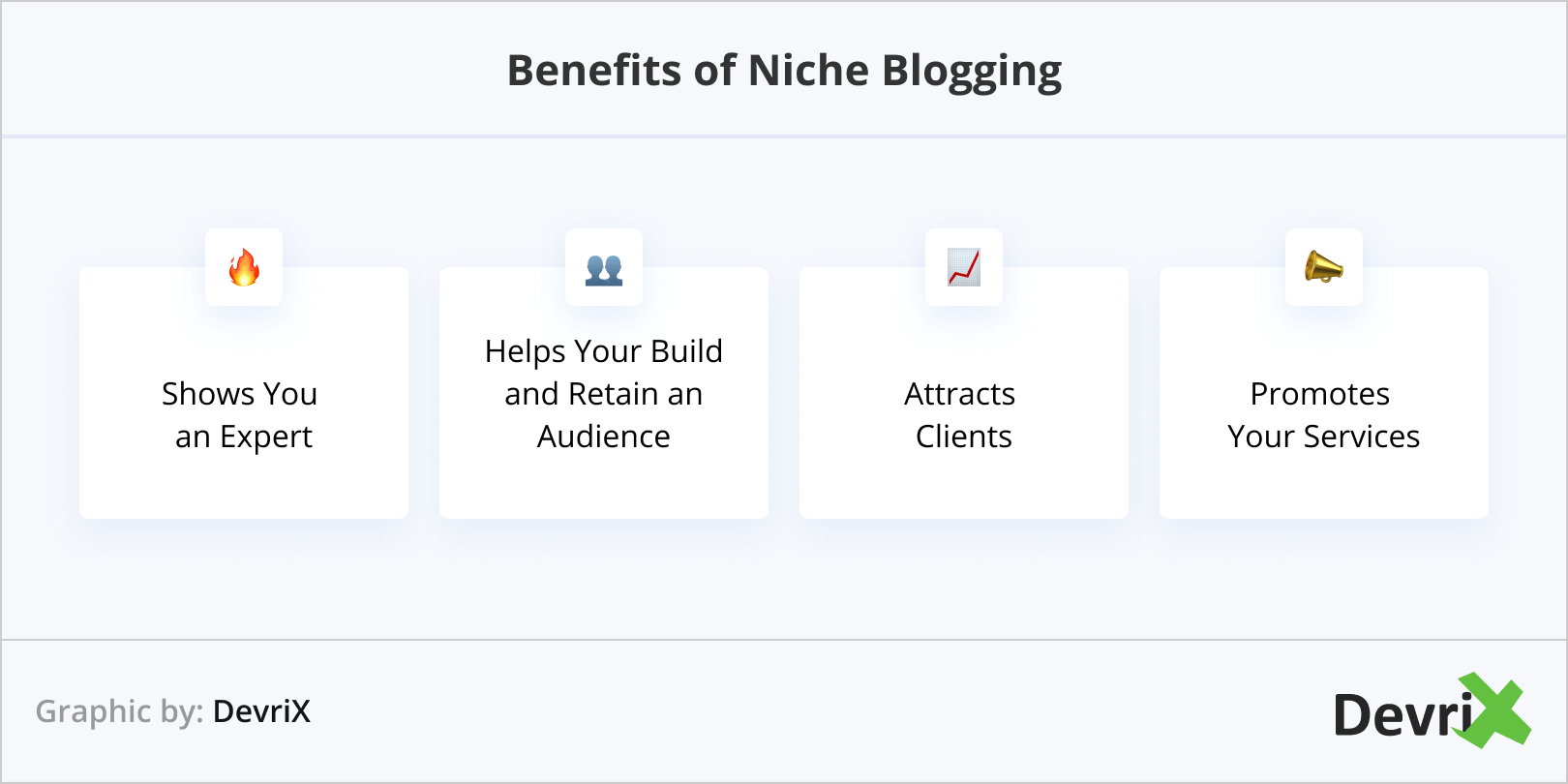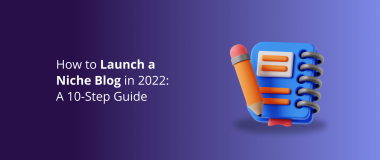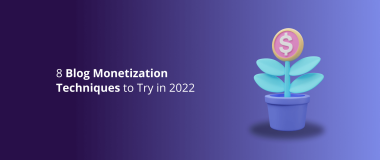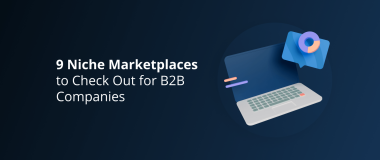Blogging is the pinnacle of content marketing and has proven to be the most reliable and successful way to build traffic and attract an audience the inbound way.
However, for your blog to be a business endeavor that lives up to expectations and contributes to your bottom line, you need to approach it strategically.
That’s why you should stop what you are doing and launch a niche blog.
A well-planned and maintained niche blog can power up your business, bring in new clients, and boost your online presence. Furthermore, with the proper SEO optimization, it can help you establish your brand and name in the SERPs as the go-to expert in the industry.
But how is a niche blog different, and what are the benefits?
In this article, we walk you through everything you need to know about niche blogging, and how to use it to boost your business success.
Read on and take notes!
What Is a Niche in Blogging?
In blogging, a niche is the main topic of your content – it’s the touchpoint between all of your articles.
What differentiates a niche blog, is that, instead of writing on all kinds of topics that interest you and are somewhat relevant to your business, you target all your efforts at the issues that attract the best audience.
In other words, it’s putting the Pareto principle into work before you even start publishing. This way, instead of wasting 80% of your time and resources on content that may or may not attract some audience, you are focusing on the 20% of articles that are the most efficient.
This 20% is your niche.
How to Find a Niche for a Blog

Choosing a niche depends on your knowledge, experience, and expertise.
However, you should also take into account the audience you are targeting and the overall goals of your endeavor. Furthermore, it’s advisable to consider the resources at your disposal and the long-term plan for your blog.
In line with these, your niche can be a whole industry, a branch of the industry, or even a single topic.
For example, digital marketing is a broad niche. If you focus on it, you can write content about SEO, affiliate marketing, content marketing, tools, monetization, and so on, and so forth.
However, each one of these topics is a narrow niche that you can decide to pursue exclusively.
On the one hand, choosing too broad a niche provides you with more content opportunities and makes it easier to come up with new topics. At the same time, it might make it challenging to retain your audience, as some of the content you publish may not be relevant to them – too much of this content can even drive them away.
Furthermore, the more general the topic, the more subtopics you need to be an expert in. Failing to deliver top-quality content will hurt your credibility and trustworthiness.
On the other hand, if your niche is too narrow, it will be easy to attract and engage loyal followers, but at a certain moment, you may exhaust the content potential of the niche and struggle to deliver new articles consistently. This, in turn, can cause your audience to lose interest.
All in all, choosing a blogging niche is a delicate matter and needs to be approached with due diligence, consideration, and balance.
The better you plan your efforts, the more successful your niche blog will be.
Benefits of Niche Blogging
One of the best things about niche blogging is that it allows you to better organize and streamline your efforts. You can approach your goals systematically and pursue them with a clear vision.
However, the benefits don’t end with that:

Shows You an Expert
When you focus on one blog niche, you can consistently work on exhausting all the relevant topics. This will not only allow you to showcase your expertise but even grow it.
While researching topics and interacting with your audience, you may learn new information, find new aspects of the niche, and new angles to explore.
By leveraging these, you can work on case studies, experiment with ideas, and push the limits of your own knowledge.
And the more you know, the more your expertise will grow. As a result, you can establish yourself as a thought leader and an authority in your field, and be more likely to win the trust of your readers.
Building your credibility as an expert goes hand in hand with your personal branding, and is a deciding factor in your success.
Furthermore, it contributes to your search engine success as well, because, for Google, expertise, authority, and trustworthiness (EAT) are key ranking factors.
Helps You Build and Retain an Audience
As mentioned, with a niche blog it’s much easier to find an audience that is interested in what you offer and keen to learn more. It’s the same as with specialized publications and industry journals – people subscribe to them because they know the benefits, and don’t want to miss a thing.
However, the digital format takes this to a whole new level because it allows instant feedback and two-way communication.
The more targeted your audience is, the easier it is to build a connection with it and relate on a deeper level. As a result, you can better understand its needs and provide content that is on-point and valuable.
Furthermore, a niche blog allows for better content planning and structure, which leads to improved consistency. And the more consistent you are, the easier it is to “train” your readers to look forward to your articles.
All this adds up to creating a loyal audience with a higher engagement rate and, eventually, more conversions.
Attracts Clients
When you publish a niche blog and optimize it for SEO, you can attract organic traffic, claim the leading positions in the SERPs, and overtake your competitors.
As a result, when potential clients are looking up products and services that match your keywords, your links will (hopefully) be the first ones they see in the search engines. This will show you as a credible and reliable choice.
Furthermore, once they land on your website, they will see all the relevant topics you are covering, and will know that you are an expert that can be trusted.
While we all know that the brands on the first page of Google are not necessarily the ones with the best products, the authority a top SERP position provides makes all the difference to the client.
This means that if you combine the advantages the niche blog provides with top-quality products, you will not only attract but retain your customers.
Promotes Your Services

Inbound marketing is one the most powerful ways to promote your business and blogging is the centerpiece of it. It’s not as invasive and aggressive as advertising and allows customers the gratifying feeling that they have discovered your business themselves, as opposed to you imposing it on them.
As such, one of the greatest benefits of starting a niche blog is that you can indirectly promote your business and services, and if you do it properly, clients will be coming to you, instead of you chasing after them.
Also, the inbound approach is way more subtle and effective because it asks for nothing in return. You show that you know what pain points your customers are facing, you understand their needs and struggles, and – most importantly – that you know how to help.
On top of that, you are not telling your clients to buy your products, you are only showing them how they can benefit from using them.
And that’s the best kind of promotion.
How to Monetize a Niche Blog

Even if you are not selling a product, there’s a myriad of ways to monetize a blog. With niche blogs, these are even more reliable and successful.
When you have a loyal audience that trusts you, it’s easier to convince people to pay for a subscription, buy an affiliate product that you recommend, click on your ads, hire you as a consultant, or whatever else you choose to try.
Furthermore, the more credibility you have, the easier it will be to build lasting partnerships with other businesses, blogs, and influencers, and boost the performance of your content even further.
When it comes to niche blogs, the monetization opportunities include, but are not limited to:
Allowing display ads
Nowadays, display ads are aligned with the type of content on the page in order to increase the chances of people clicking on them. As a result, they can be an easy way to make money off your blog without almost any additional effort.
Featuring affiliate links
Affiliate links are one of the most natural ways to monetize a blog, especially when they are reasonably placed and not too obvious. By recommending the products you use and trust and that your readers can benefit from, you can accumulate revenue, all the while helping both your audience and partners.
Putting up a paywall (a.k.a subscriptions)
When you build a loyal audience, you can consider putting some of your content behind a paywall. This can be interviews, membership services, loyalty programs, partner discounts, early access benefits, and whatever else applies to your niche. However, it’s best to continue offering most of the value you provide for free, otherwise, you may drive your readers away.
Publishing sponsored content
Sponsored content on relevant topics can provide the occasional income boost, but shouldn’t be overused unless, for example, you are publishing a dedicated reviews blog. If this is the case, make sure that the reviews are reliable and trustworthy. Other types of blogs can feature sponsored articles that are formatted to match their own in terms of structure and topics, but are marked as paid publications.
Creating eBooks
You can organize the content of pillar pages and topic clusters into eBooks and sell them on Amazon and other similar platforms. While, more often than not, these are not very expensive, compiling and preparing them takes minimal effort, and pays off in consistent income.
Providing coaching service
Once your blog is up and running, and you’ve established your authority and expertise, you can provide individual coaching services to your readers. Although most of the information you offer is already available on your blog, people are still likely to pay for your time, as it ensures an organized and personalized approach.
Launching online courses
Even if you are not willing to go the extra mile and have one-on-one sessions with your readers, you should consider organizing the content of your blog into one or more online courses. This type of format is all the rage nowadays, and, if you promote your courses well and publish them on relevant platforms, they can help you build substantial revenue.
Writing guest posts as a topic expert
As a backlink building and blog promotion technique, guest blogging is usually a free service. However, when you are an expert in your field, other websites may agree to pay you to write pieces for their audience.
How to Start a Niche Blog
Starting a niche blog is much similar to starting any other kind of blog – you need to create a website and write interesting content.
However, to be successful, your niche blog needs a tad bit of additional preliminary work:
Choose your niche
Make sure that you are an expert in the field you choose and that you are capable of consistently providing valuable content. To that end, the niche shouldn’t be too broad or too narrow.
Research your audience
The goal of your blog should be to contribute to making the reader’s life better – in other words, you have to provide value. In order to be able to do that, first, you need to find out what your audience cares about, and what its pain points and needs are.
Research competitors
If you are to stand out in the busy digital marketplace, competitive research should be done at different stages of creating your niche blog. This way you will not only know who you are up against in the battle for the client’s attention, but will be able to better plan your personal branding, your content strategy, etc.
Make a keyword list
Research and group the keywords that your content will focus on, and structure them in hierarchical order. This list will inform your future content efforts, and help you prioritize your work.
Set up a workflow
With an easy-to-follow workflow, you can streamline the content creation process, better focus, and increase your productivity.
Create an editorial calendar
Consistency is the key to retaining your audience. By creating an editorial calendar, you can better plan your articles and make sure you never run out of topics to publish.
Start creating content
Once you are done with the preliminary work, you can start working on your content. Before publishing, make sure to create a stockpile of articles, and populate your calendar for a month or two ahead. This way, you will reduce the inevitable pressure at the start, and minimize the risk of setbacks. Also, don’t skip SEO.
Promote your articles
Nowadays, it’s difficult to make a breakthrough in almost any niche. To ensure that there will be enough traffic to your blog – both paid and organic – make sure to devise a blog promotion strategy on all the relevant channels that your target audience favors.
Bottom Line
Content marketing is a powerful tool for companies, in fact, over the years, it has become a flourishing business. While there are different types of content that you can utilize in your strategy, blogging has proven to be the most efficient one.
By launching a niche blog, you can attract your preferred target audience, engage them, and monetize their affection. Furthermore, you can show that you are an expert and build credibility and authority in your industry.
Just remember, when you consider launching a business blog, if you want to dominate the SERPs and outshine the competition, choose your niche wisely.




